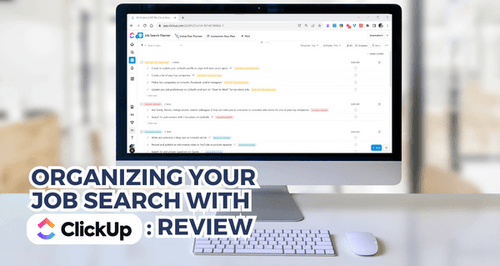
4 Strategies Beyond Networking For Your LinkedIn Job Search
When most people think of using LinkedIn during their job search, networking immediately comes to mind. And while networking is undeniably powerful, relying on it alone can limit your opportunities.
LinkedIn has evolved into a versatile platform that offers far more than just connecting with professionals. By leveraging these additional strategies, you can supercharge your LinkedIn job search and stand out to recruiters and employers alike.

This blog contains affiliate links, meaning I may receive a small commission (at no cost to you) if you subscribe or buy something through the links I share. I only share links to products or services that I use myself or absolutely love!
Personal Branding On LinkedIn
- Share Valuable Content: Regularly share articles, post updates, or provide insights that showcase your expertise. For example, if you're a project manager, share press releases about projects you've supported or news about emerging trends or technologies in the field.
- Engage Thoughtfully: Don’t just scroll through your feed—leave meaningful comments on industry-relevant posts. A thoughtful comment continues or starts conversations rather than simply acknowledging the post. This is a great way to get your profile noticed by hiring managers and recruiters, even those who aren't connected to you yet.
- Publish Your Own Content: LinkedIn's publishing platform allows you to write and distribute long-form articles for free. Writing about challenges or innovations in your industry can establish credibility and create a lasting impression. LinkedIn's algorithm will also favor articles on their platform instead of external websites, so your insights will get more visibility on LinkedIn.
Investing in your personal brand can help recruiters associate your name with expertise in your field—making you a candidate they’ll want to reach out to.
Targeting Employers Strategically
Instead of waiting for opportunities to come to you, take the proactive approach of targeting specific companies.
- Use Advanced Search Filters: LinkedIn’s search features allow you to narrow down companies of interest by location, company size, and industry. Identify companies aligned with your goals and discover who works there to learn more about the company's culture. This is a great way to make contacts within the companies you'd love to work for.
- Save Searches and Set Alerts: Once you’ve narrowed your search, save it! LinkedIn allows you to set up job alerts for specific criteria, ensuring you’re notified about new LinkedIn jobs that match your preferences. Starting with the company can help you refine these notifications and make them more relevant to your overall career goals.
- Research Key Players: Look at profiles of employees in your desired department or team. Understanding their backgrounds can give you insights into the company culture and the skills they value. These insights will help you come up with icebreakers and conversation starters that will encourage a response during targeted networking efforts.
By focusing your efforts on specific employers, you position yourself as a deliberate and informed candidate.
Struggling to get your foot in the door? This step-by-step Employer Targeting Plan helps you narrow down what your ideal employer looks like and target those companies instead of job titles
Reaching Out to Recruiters The Right Way
- Craft Polished Messages: Personalize your messages. Mention something specific, like a shared connection or a common interest you find on their profile, and briefly explain your career goals. Make sure you're connecting with a recruiter who is filling jobs in your field so you don't waste their or your time.
- Ask for Advice, Not Just Jobs: Instead of diving straight into “Can you help me find a job?”, ask about trends they’ve noticed in hiring or the skills most in demand in your field. You can also ask to keep you in mind for opportunities down the road, even if they aren't a good fit for you, so you can help by sharing them with your network.
- Leverage Referrals: Use your existing connections to get introductions to recruiters or hiring managers. A warm referral can make your message more likely to get noticed. Privately messaging your friends and family members about your job search can get the ball rolling.
Remember, recruiters are looking for candidates who bring value. Make your outreach professional, concise, and genuine.
Following Up Like a Pro
- Direct Follow-Up Messages: After a job application or interview, send a thank-you note or ask for an update to a contact you've made within the company. Be polite and express continued enthusiasm for the role or company.
- Engage Softly: Following up doesn’t always have to be direct. Commenting on or liking a recruiter’s or hiring manager’s recent post can keep you visible in a less formal way.
- Stay Active: Regular LinkedIn activity—posting updates, sharing content, and engaging with others—signals to recruiters that you’re approachable and responsive. This matters because many recruiters look for candidates with current activity on their profiles because they're more likely to respond to messages.
Balancing persistence with professionalism ensures you don’t come across as desperate but remain memorable.
Conclusion
Your job search on LinkedIn shouldn't rely solely on networking. By building a compelling personal brand, targeting employers, reaching out to recruiters effectively, and following up strategically, you can take your LinkedIn job search strategy to the next level.
Remember, LinkedIn is a dynamic tool, and the key to success lies in using all its features to showcase your value as a candidate. So, don’t just connect—engage, share, and target with intention. Your next opportunity could be just one strategic move away.
Related Articles
-

The Ultimate Guide To Resetting Your Job Search
Reset your job search with a step-by-step strategy to audit applications, clarify target roles, stay organized, and land interviews faster.
-

Career Transitions: Navigating Your Path to Success in Healthcare and Beyond
Guest blogger Sadie Smith shares how to leverage your existing skills and experience while pursuing new career opportunities in healthcare and other industries.
-

Navigating An Evolving Job Market With Strategies For Success
To thrive in a dynamic job market, you need to continuously adapt your job search strategies. Stay informed and flexible to position yourself for success.
-

12 Strategies To Build Networking Connections That Lead To Job Offers
Breaking down the value of networking and the top strategies to harness the power of making strategic connections to land the job of your dreams.
-

Organizing Your Job Search With ClickUp: Review
This review shares how ClickUp, a free desktop and mobile app for business AND personal use, can be used for organizing your job search and holding you accountable toward achieving your career goals.
-

5 Ways To Stand Out At A Career Fair
Learn how to stand out at a career fair (virtual or in-person!) to move you forward in your job search, especially if you're changing careers or have an unconventional work history.
-

Negotiating A Competitive Salary
Guest blogger Rohan Singh shares strategies for negotiating a fair salary that reflects your worth and fulfills your goals.
-

The Ultimate Temping Guide for Beginners
Guest blogger Auria Heanley with Oriel Partners shares insight into what a temp job is and what to expect in order to make the most of a new job opportunity.
-

How To Get More Informational Interviews
These tips outline how to get more informational interviews during your job search and expand your options by making this networking approach your primary strategy to find a job.












